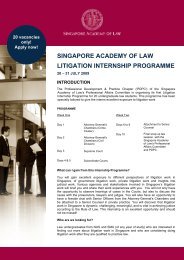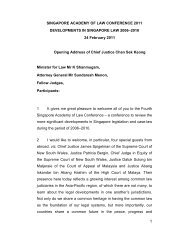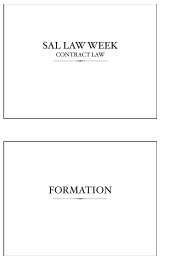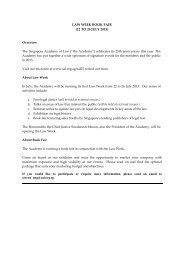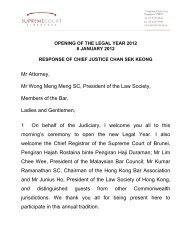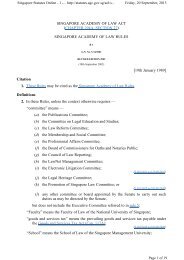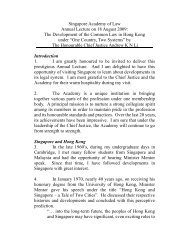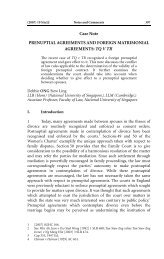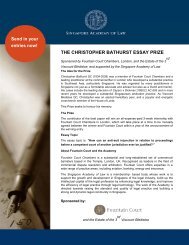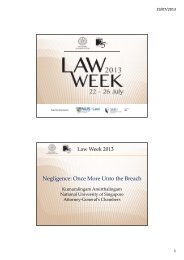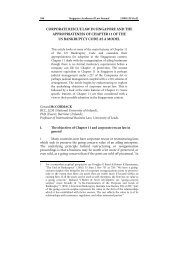2. Managing Mens Rea in Singapore - Singapore Academy of Law
2. Managing Mens Rea in Singapore - Singapore Academy of Law
2. Managing Mens Rea in Singapore - Singapore Academy of Law
Create successful ePaper yourself
Turn your PDF publications into a flip-book with our unique Google optimized e-Paper software.
330S<strong>in</strong>gapore <strong>Academy</strong> <strong>of</strong> <strong>Law</strong> Journal (2006)part <strong>of</strong> the <strong>in</strong>quiry – it is probative, not dispositive, <strong>of</strong> knowledge. It isquite possible that the facts <strong>of</strong> a particular case will show that the accuseddid not actually know, although a reasonable person ought to haveknown. 4429 Where the Legislature has clearly prescribed a particular mens reafor an <strong>of</strong>fence, the courts have no legitimate creative function to fashionother forms <strong>of</strong> mens rea which they feel will do better. Yet <strong>in</strong> a series <strong>of</strong>drugs and immigration cases, the courts have done just that. 45 The Misuse<strong>of</strong> Drugs Act (“MDA”) makes it an <strong>of</strong>fence to traffic <strong>in</strong> a controlled drug,or to possess a controlled drug for the purpose <strong>of</strong> traffick<strong>in</strong>g. 46 Where thedrug exceeds a certa<strong>in</strong> stipulated amount, the MDA famously imposes amandatory sentence <strong>of</strong> death. 47The question is whether, to be guilty <strong>of</strong>the <strong>of</strong>fence, the accused must know that the th<strong>in</strong>g trafficked or possessedis a controlled drug. The words “traffic” and “possess” and its cognateexpressions are ambiguous. The precise mens rea <strong>of</strong> (especially) theelement <strong>of</strong> possession has been historically problematic both locally andelsewhere. 48 Even so, one might have thought that given the existence <strong>of</strong> amandatory death penalty, the uncerta<strong>in</strong>ty ought to be resolved <strong>in</strong> favour<strong>of</strong> the accused and a mens rea <strong>of</strong> knowledge required by implication.Indeed, the MDA conta<strong>in</strong>s a presumption which ought to have settled thematter:44 There could be any number <strong>of</strong> reasons. For example, the accused may possess certa<strong>in</strong>personal characteristics which are not taken <strong>in</strong>to account for the test <strong>of</strong> thereasonable person, or the accused was simply be<strong>in</strong>g less prudent than a reasonableperson would have been.45 Many <strong>of</strong> the ideas <strong>in</strong> this section were developed from those first expressed <strong>in</strong> twoarticles: Michael Hor, “Misuse <strong>of</strong> Drugs and Aberrations <strong>in</strong> the Crim<strong>in</strong>al <strong>Law</strong>”(2001) 13 SAcLJ 54; Michael Hor, “Illegal Immigration: Pr<strong>in</strong>ciple and Pragmatism <strong>in</strong>the Crim<strong>in</strong>al <strong>Law</strong>” (2002) 14 SAcLJ 18.46 Section 5, Misuse <strong>of</strong> Drugs Act (Cap 185, 2001 Rev Ed).47 MDA, id, Second Schedule.48 An important precedent <strong>in</strong> the pro-knowledge camp is Toh Ah Loh v R [1949] MLJ54 (“Toh Ah Loh”), which declared, at 54–55:Possession, <strong>in</strong> order to <strong>in</strong>crim<strong>in</strong>ate a person, must have the follow<strong>in</strong>gcharacteristics. The possessor must know the nature <strong>of</strong> the th<strong>in</strong>g possessed,must have <strong>in</strong> him a power <strong>of</strong> disposal over the th<strong>in</strong>g, and lastly must beconscious <strong>of</strong> his possession <strong>of</strong> the th<strong>in</strong>g. If these factors are absent, hispossession can raise no presumption <strong>of</strong> mens rea, without which (except bystatute) possession cannot be crim<strong>in</strong>al.Though widely respected, Toh Ah Loh did not command absolute allegiance: see, forexample, Leow Nghee Lim v R [1956] MLJ 28, and the early but able discussion <strong>of</strong>Bron McKillop, “Strict Liability Offences <strong>in</strong> S<strong>in</strong>gapore and Malaysia” (1967) 9 MalLR 118 at 137–144, who concluded rather gloomily, at 144:It seems almost that for every case <strong>in</strong> which the courts here have opted for mensrea another case on the same or a similar <strong>of</strong>fence can be found <strong>in</strong> which liabilityhas been held to be strict, and vice-versa.



